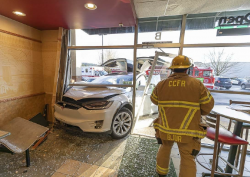
— The driver of a 2018 Tesla Model X has filed a sudden acceleration lawsuit that alleges the Tesla SUV flew through the wall of a restaurant while the driver's foot was allegedly over the brake pedal preparing to stop.
According to the Tesla sudden acceleration lawsuit, plaintiff Hacene Djemil was driving his Model X in a parking lot in Woodland, Washington. His wife and two children were with him as he planned to park to enter a Starbucks.
Mr. Djemil says he made a right turn into a parking spot in front of the Subway restaurant that was adjacent to Starbucks, with his foot positioned over the brake pedal preparing to stop in the parking spot.
The Tesla lawsuit alleges that's when the "Model X vehicle experienced sudden uncommanded full power acceleration, causing it to surge forward across the sidewalk in front of the commercial businesses and toward the glass windows in the front of the Subway restaurant."
The sudden acceleration lawsuit says the plaintiff "was able to steer the Model X to the right and into the wall of the restaurant, instead of plowing through the tables and food counter of the restaurant."
The front seat passenger suffered a cracked sternum and the the lawsuit alleges the two children "suffered physical injuries and emotional distress as a result of the collision."
According to the sudden acceleration lawsuit, Tesla vehicles are equipped with event data recorders that save all data when an airbag deploys. But the lawsuit alleges the recorder contains only a fraction of data from the vehicle and stored by Tesla.
Tesla Sudden Acceleration Complaints
The sudden acceleration lawsuit references 192 complaints submitted to the National Highway Traffic Safety Administration (NHTSA) from September 2016 and June 2020 regarding Tesla sudden acceleration incidents. The Tesla lawsuit also alleges 171 crashes and 64 injuries have been reported by complainants.
In January 2020, NHTSA announced it received a petition to investigate alleged Tesla sudden acceleration incidents. The petition asked NHTSA to open a formal investigation into a reported 110 crashes and 52 injuries allegedly caused by sudden unintended acceleration in Tesla vehicles.
The petitioner told NHTSA the vehicles were dangerous to drive and 2012-2019 Tesla Model S, 2016-2019 Model X and 2018-2019 Tesla Model 3 vehicles should be recalled.
A year later the government announced an official investigation wasn't needed because Tesla sudden acceleration incidents were allegedly caused by drivers pressing the accelerator pedals, typically instead of the brake pedals.
Considering these are electric vehicles that can do zero to 60 in three seconds, it doesn't take long to send a vehicle into a wall or other object.
NHTSA denied to open an investigation after finding "no evidence of any fault in the accelerator pedal assemblies, motor control systems, or brake systems that has contributed to any of the cited incidents."
Federal safety regulators determined based on the evidence, "pedal misapplication" was to blame for the Tesla sudden acceleration complaints.
The lawsuit alleges the Tesla vehicles should never suffer from unintended acceleration incidents because the vehicles are equipped with automatic emergency braking.
But the plaintiffs say the Tesla system doesn't work when the vehicle is traveling at slow speeds, and the system apparently has been designed and programmed to deactivate when it receives instructions from the accelerator pedal to "drive full speed into a fixed object."
In addition, the vehicle alegedly shouldn't slam into stationary objects because in October 2018, the automaker introduced a software program called “Obstacle-Aware Acceleration” designed to “reduce the impact of a collision by reducing motor torque and in some cases applying the brakes” if the vehicle detects an object in its driving path.
The lawsuit says the system is triggered when traveling less than 10 mph, something that allegedly didn't occur in the Washington Model X crash.
The Tesla sudden acceleration lawsuit was filed in the U.S. District Court for the Western District of Washington: Djemil, v. Tesla, Inc., et al.
The plaintiffs are represented by the Slavik Law Firm, LLC, McCune Wright Arevalo LLP, and Bailey Glasser LLP.




